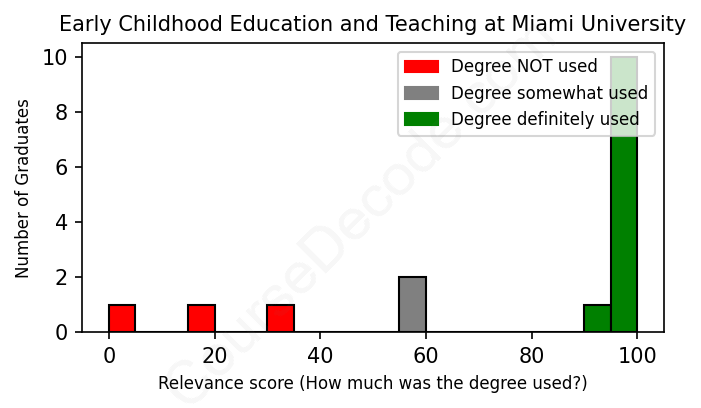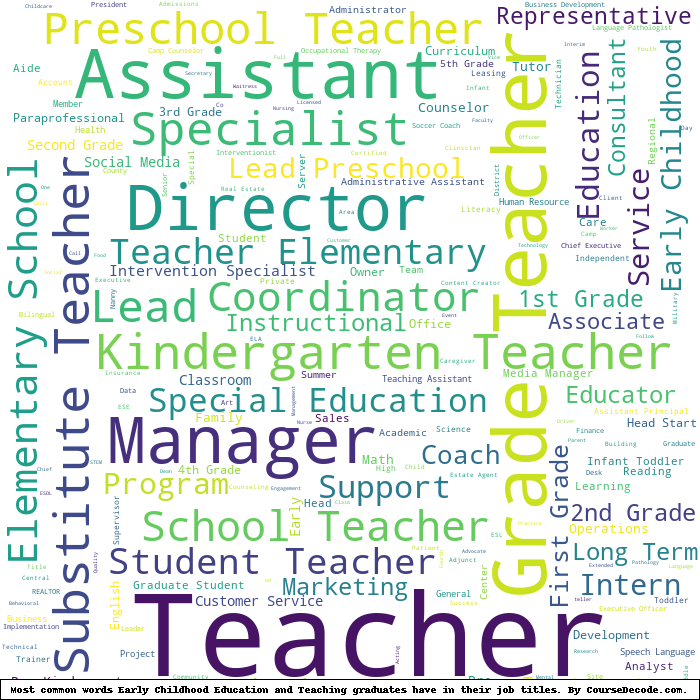
First, some facts. Of the Early Childhood Education and Teaching graduates from Miami University we've analyzed , here's how many have used (or NOT used) their degree in their career:

These are estimates based on AI analysis of 16 LinkedIn profiles (see below).
The verdict? Significantly above average. Overall, with an average relevance score of 78%, Early Childhood Education and Teaching graduates from Miami University have a much higher likelihood (+11%) of finding work in this field compared to the average graduate across all fields:
And for comparison, here's the chart for all profiles we've looked at across all degrees.
Also, after graduating, only 31% of these graduates have pursued further education other than another Bachelor's degree (such as a Masters degree or other), compared to the average across all profiles of 35%. This suggests a Bachelors degree is enough for most Early Childhood Education and Teaching graduates, and it's normal to look for work straight after graduation.
See the details:
|
Relevance score: 97% We think this person has gone into a career highly relevant to their degree. We think this person has gone into a career highly relevant to their degree.
DEGREE INFOGraduated in 2010 from Miami University with a Bachelor's degree in Early Childhood Education and Teaching. Also pursued further education since (see below). JOB HISTORY SINCE GRADUATIONElementary School Teacher Denver Public Schools Jul 2010 - Jun 2016 Elementary School Teacher  Korea International School Jul 2016 - Jun 2019 Elementary School Teacher  Colegio Franklin Delano Roosevelt, The American School of Lima Jul 2019 - Jul 2023 Content Developer  Educators Cooperative Jan 2024 - Present FURTHER DEGREES DONE SINCE GRADUATINGMaster's degreeUniversity of Colorado Denver 2012 - 2014 ABOUTNo information provided. |
The top 10 most common jobs done by the graduates we've analyzed (ranked most common to least) are:
Based on the LinkedIn profiles analyzed, it’s clear that most of the individuals who graduated with a degree in Early Childhood Education and Teaching from Miami University have primarily gone on to work in teaching roles, particularly as elementary or kindergarten teachers. Many started their careers immediately in traditional classroom settings, where they could leverage their training in child development and educational practices directly. It's also common to see positions such as Teacher Librarian or Family Literacy Program Director, which, while slightly outside the typical classroom environment, still heavily hinge on the principles of early childhood education, like literacy development and educational engagement for young learners.
However, as we look further down the list, there are several examples of graduates who have ventured into roles that seem less aligned with their degree, such as marketing coordinators or banking customer service positions. While some skills from their education could be applicable in these jobs—like communication and organizational skills—many of these roles don't require the specific expertise in early childhood education that their degree offers. So, while the dominant trend showcases a strong relevance to early childhood teaching, there is definitely a section of graduates who have taken their careers in directions that don't directly relate to their initial studies. Overall, though, the majority have remained committed to roles that validate their educational background and align well with the field of early childhood education.
Here is a visual representation of the most common words in job titles for Early Childhood Education and Teaching graduates (this is across all Early Childhood Education and Teaching graduates we've analyzed, not just those who went to Miami University):

It looks like graduates from the Early Childhood Education and Teaching program at Miami University tend to have pretty solid career trajectories that stick closely to their field. When they first step into the job market after graduation, the majority land positions as classroom teachers, primarily in elementary schools. For example, many of them took on roles in districts right after graduation, teaching various grade levels. This initial trend makes sense since they’ve just completed their degree, and it aligns perfectly with their training and expectations. Some have even ventured into specialized roles, like librarian positions or content development in education-focused organizations.
Fast forward five to ten years, and you’ll see that while many continue their teaching careers, a good number have shifted into more diverse roles within education or related fields. For instance, we see some moving into program management or community liaison positions. There’s also evidence of some pursuing leadership roles or even branching into administrative functions. While a few have dabbled in entirely different industries, like marketing or retail, the overall trend indicates that many continue to build successful careers that are relevant to early childhood education, which is reassuring for those considering this path. So, if you're thinking about studying Early Childhood Education, there’s a good chance you could end up with a fulfilling career in something you love!
Getting a Bachelor’s degree in Early Childhood Education and Teaching at Miami University or any school isn't super easy, but it’s definitely manageable for most people who have a passion for working with young kids. You’ll dive into a bunch of different subjects like child development, classroom management, and educational psychology, which can be really interesting if you like that stuff. The workload can be pretty steady with assignments, projects, and maybe some fieldwork, but it’s generally structured well, so you won’t be overwhelmed. If you stay organized and engaged, it’s not as hard as some hyper-technical degrees, and you’ll probably find it rewarding as you learn about how kids grow and learn.
Most commonly, in the LinkedIn profiles we've looked at, it takes people 4 years to finish a Bachelor degree in Early Childhood Education and Teaching.
Looking at the job paths of these Early Childhood Education grads from Miami University, it seems like they’ve mostly been sticking to solid teaching positions, which can be rewarding but not always high-paying. Many started as teachers, and while some moved into higher roles like librarians or program directors, salaries in education generally don't reach the same levels as, say, tech or finance. They’ve got jobs that make a positive impact on kids' lives, which is awesome, but when it comes to making decent money, it looks like they might not have hit the jackpot. The ones who ventured into roles like content development or marketing may have a better shot at more lucrative salaries. Overall, it’s clear they’re passionate about education, but if they were aiming for big bucks, they might need to explore more diverse career paths!
Here is a visual representation of the most common words seen in the "about" section of LinkedIn profiles who have a Bachelor degree in Early Childhood Education and Teaching (this is across all Early Childhood Education and Teaching graduates we've analyzed, not just those who went to Miami University). This may or may not be useful:

Here are all colleges offering a Bachelor degree in Early Childhood Education and Teaching (ordered by the average relevance score of their Early Childhood Education and Teaching graduates, best to worst) where we have analyzed at least 10 of their graduates:
| College | Score | Count |
|---|---|---|
 Kennesaw State University Kennesaw State University
|
86 | 10 |
 The University of Georgia The University of Georgia
|
81 | 12 |
 Miami University Miami University
|
78 | 16 |
 University of Cincinnati University of Cincinnati
|
77 | 10 |
 Kent State University Kent State University
|
75 | 13 |
 Ashford University Ashford University
|
59 | 39 |